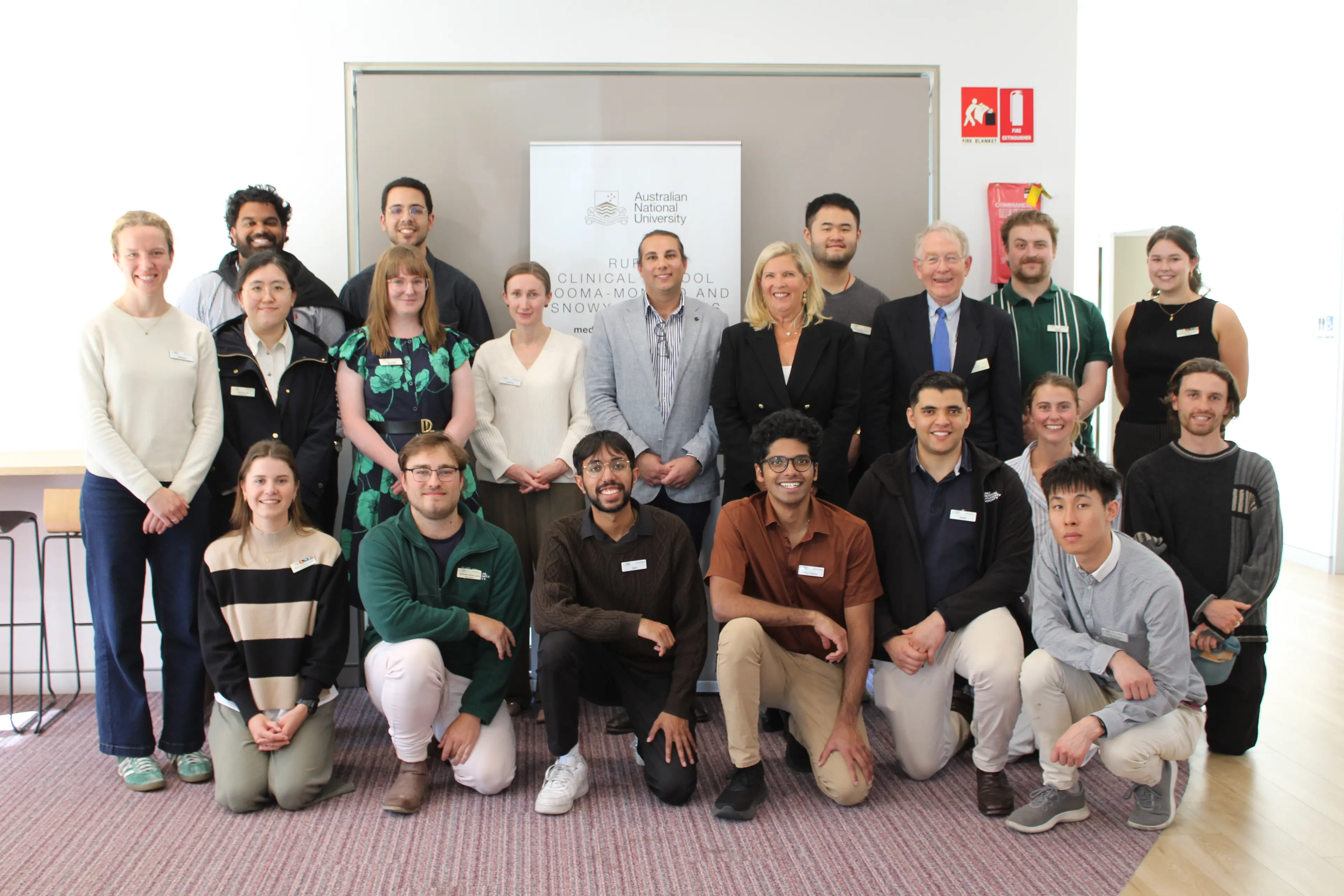PHOTO
By MELINDA CAIRNS HACK
Access to timely, high-quality medical care continues to be one of the biggest challenges facing rural and remote communities across Australia.
To help address this, the ANU School of Medicine and Psychology, Rural Clinical School each year sends first and second-year post-graduate medical students to its campuses across South Eastern NSW for hands-on rural health experiences and community engagement.
Beginning the week of 13 October, 17 second-year students spent four days in Cooma and the Snowy Mountains for Rural Week 2.
Students were warmly welcomed by Bronnie Taylor, one of the first McGrath breast cancer nurses in Cooma Hospital and later during her time in NSW parliament, the first regional health minister in NSW, who shared her insights into the many rewards of pursuing a medical career in rural and regional Australia.
She highlighted the benefits of rural practice - from strong community connections and diverse clinical experiences to the lifestyle and professional advantages of living and working in country areas.
“It’s heart warming to see this program still going and all of you here with these most exciting careers ahead of you,” Mrs Taylor said.
Mrs Taylor and husband, Duncan, made a life changing decision to move from Sydney to the family farm at Nimmitabel.
“It was the best decision we ever made. I have a real passion for cancer care and primary care and loved palliative nursing which I did a lot of in Sydney. I was a hopeless farmer though; the first couple of times I went out with Dunc on the farm it was embarrassing. I am a nurse and so am used to blood and guts but we were doing something with the sheep, and I fainted; he was more embarrassed than I was.
“I thought that’s it I’m going to work and got a job on the wards at Cooma Hospital, which wasn’t my specialty of primary care but it was fantastic.
“Then all of a sudden I got swept up in this amazing community and I saw really brilliant care and people who actually cared about their community.”
Mrs Taylor ended up in primary care becoming a cancer nurse and in palliative care.
Mrs Taylor said nowadays doctors and health staff are supported by technology such as virtual care (and the beneficial educational opportunity it presents) and their lifestyles can be better balanced.
“Don’t think rural is about being isolated, you are so supported by many different mechanisms now,” Mrs Taylor told the students.
“Your careers will be very rewarding if you choose to go rural and regional.”
Head, Rural Clinical School, Professor Sally Hall Dykgraaf, acknowledged the importance of rural communities and what can be achieved when communities come together.
Professor Dykgraaf also highlighted to the students the lifestyle benefits of living and working rurally.
Snowy Monaro Regional Council mayor, Cr Chris Hanna, wished the students a great week in Cooma and the Snowy Mountains and encouraged the students to consider coming back to the area.
The week’s fully packed program offered a wide range of clinical and community experiences. Students visited the Cooma Ambulance Station and Emergency Services Operations Centre in Polo Flat, where they observed a simulated motor vehicle accident and participated in hands-on emergency response demonstrations, including the use of rescue equipment.
They also heard from local doctors Dr Hanna Munclinger and Dr Laura Roden, who shared their own journeys in rural medicine.
A visit to the Perisher Medical Centre, hosted by Dr Lincoln Pike, introduced students to alpine, remote, and extreme medicine, and the unique opportunities available to doctors working in the alpine regions.
A hike from Perisher Valley to Guthega proved a highlight with plenty of snow left for some snowball fun on a perfect spring day.
Students also took part in clinical placements throughout Cooma District Hospital, local general practices, and at both Hudson House and Yallambee Lodge aged care homes. On the Thursday, local clinicians and current long-term ANU students led a series of rotating skills workshops, covering key procedural skills and hands-on practice.
Social activities included lawn bowls and dinner at the Cooma Bowling Club, a Capital Dial-A-Pizza night with emergency services, and a dinner with local doctors at Rose’s Family Restaurant.
The week concluded with a panel of local doctors at different career stages, showcasing the diverse career pathways available in rural medicine.
One student summed up the experience as “amazing”, a sentiment echoed by many others, with several expressing a strong interest in returning to Cooma and Jindabyne for their Year 3 short-term Rural GP placements.
Local GP, Senior ANU Lecturer and Academic co-ordinator, Dr Robert Wiles, together with Clinical Education co-ordinator at the ANU Rural Clinical School – Cooma Campus, Kylie Douch, extended their gratitude to the local community.
“Our Rural Weeks wouldn’t be possible without the generosity and enthusiasm of our local health professionals, emergency services volunteers, and community members,” Dr Wiles said.
“Their ongoing support helps inspire the next generation of doctors to consider a career in rural medicine and particularly in our own local region.”





